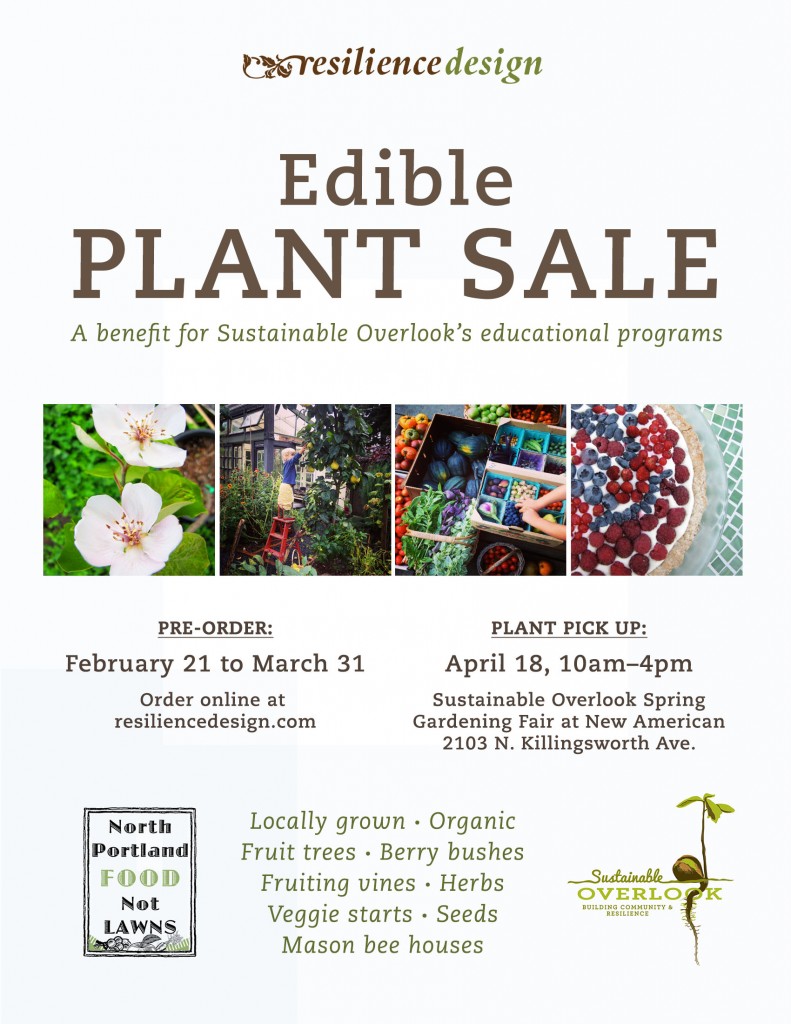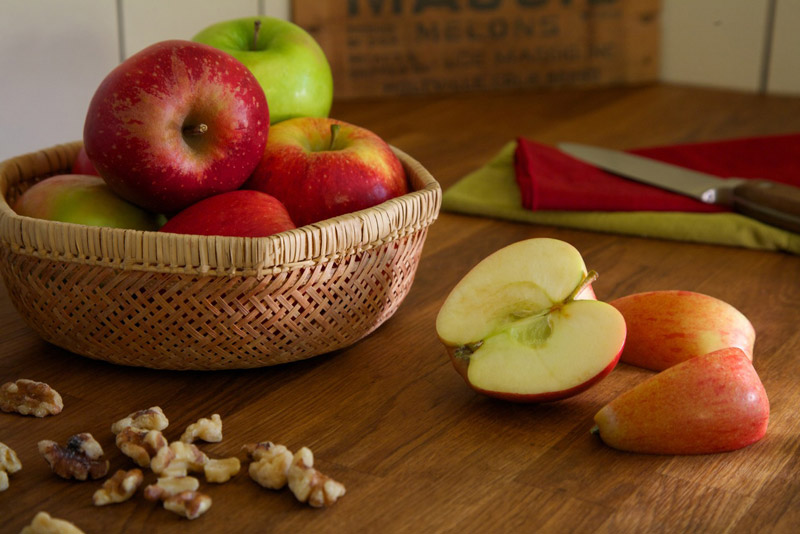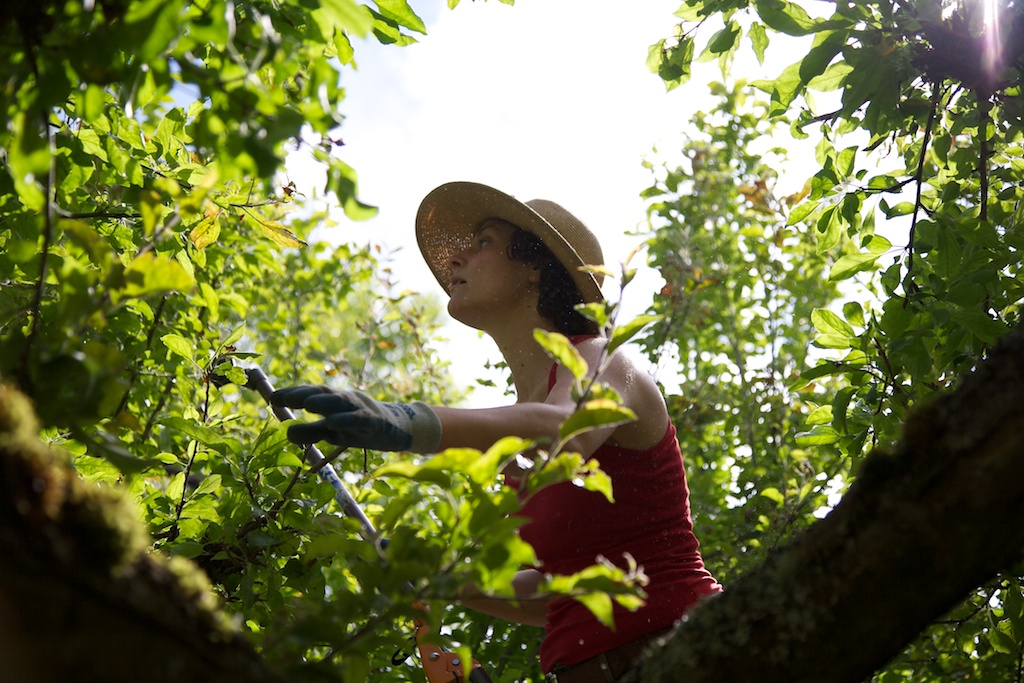KGW Ch. 8 news featured our project to become a pesticide-free neighborhood. Check out the video here: “Portland Neighbors Pledge to Stop Using Pesticides.” February 23, 2015
Edible Plant Sale
Edible Plant Sale
Pre-order: now through March 31 Click here for order forms and catalog
Plant pick-up: Saturday, April 18th, 10 am to 4 pm (New American, 2103 N. Killingsworth Ave.)
Create an abundant food forest in your yard or just add a few fun fruit and berry bushes to your landscape. Resilience Design Landscaping is holding a pre-order plant sale with pick-up at the Sustainable Overlook Spring Gardening Fair. Order from a selection of hardy fruit trees, berry bushes and fruiting vines, plus veggie and herb starts and seeds. Offerings will include apples, persimmons, blueberries, rhubarb, kiwi and much more. All the plants are locally grown (many right here in Overlook) and are organic and/or Salmon Safe Certified. A portion of the proceeds will benefit Sustainable Overlook’s neighborhood outreach projects and pesticide-free Arbor Lodge Park.
Order forms are available at www.resiliencedesign.com. Pick up your plant order on Saturday, April 18th and check out our spring info fair in front of New American with natural gardening resources from Metro, co-sponsor North Portland Food Not Lawns and more.
Fruit Tree Workshop – February 28th
The Fruit Tree Pruning Workshop has been rescheduled for Saturday, February 28th from 9 am to noon at Daybreak Cohousing. There is still time to learn proper pruning technique and get your trees in good shape for the year. Click here to register.
Overlook Sustainability Summit at Beach School 2/21
Agent of Change Training with the Center for Earth Leadership
Never doubt that a small group of thoughtful, committed citizens can change the world. Indeed, it is the only thing that ever has.
– Margaret Mead
The Center for Earth Leadership is starting a new Agent of Change training in February. Sustainable Overlook’s founder Leslee Lewis has taken this training and been involved with the Center for a number of years and highly recommends it. Led by Co-Directors Jeanne and Dick Roy, Center programs empower participants to assume a hands-on leadership role in the Northwest sustainability movement by (1) being an intentional agent of change, (2) reducing personal impact on Earth, and/or (3) becoming an assertive advocate for Earth. Here are some details on the upcoming training. Register at their website.
NEXT TRAINING:
Dates: Five Mondays –
February 23, March 2, 9, 16, and April 13
Time: 6:00-7:45 p.m.
Location: Downtown Portland
Our cornerstone Agent of Change Program begins with a six-session training, “How to Be an Agent of Change in Your Circle Influence.” Over 1,000 adults have enrolled.
Each participant selects a circle in advance of the course (see the “Project Ideas by Circle” PDF for inspiration). During the training, each participant develops a plan to effect change, and, in consultation with other participants, takes first steps to implement it. After completing the training, through our Agent of Change Network, participants receive ongoing support, inspiration, and education.
Individually, our trained agents achieve tangible, visible results as they construct building blocks for a sustainable culture within their circles of influence. Collectively, they form a legion of trained agents fanning out across the greater Portland community to transform the broader culture.
Fruit Tree Workshop Coming to Overlook
PLEASE NOTE: This workshop has been rescheduled for Saturday, February 28th. Click here to register.
Winter Pruning – Fruit Trees
Daybreak Cohousing Community Room – 2525 N. Killingsworth Ave.
January 17th, 2015 – 9 am to noon
Good, timely pruning can improve the shape, strength, and fruit set of your trees while simultaneously helping to reduce pest and disease pressure. Certain fruit trees benefit from winter pruning (Jan-Feb), while others benefit greatly from summer pruning (June-Aug). In this class we will cover the fruit trees that are best pruned in the winter, general pruning theory, as well as specific techniques to help you learn how to make the best cuts on your fruit trees with confidence and skill! Methods taught are organic and incorporate permaculture principles.
Taught by local fruit tree expert Monica Maggio of Core Fruit Institute.
$10 suggested donation. Donate by cash or check at the class or use the donate button on our about page to contribute by credit/debit.
Please register by emailing sustainable@overlookneighborhood.org with your name and contact info.
Cosponsored by Daybreak Cohousing and Sustainable Overlook
Overlook Neighborhood Sustainability Summit
Overlook to host its first Sustainability Summit
by Josh Cabot
The Overlook Neighborhood has a built-in fabric of amazing individuals that always seem busy with activities aimed at bettering our community’s health, livability and resilience. The folks that volunteer for Sustainable Overlook have met some of these amazing individuals over the past few years and would like to “circle the wagons” with these inspiring individuals and the neighborhood at large to learn more about the efforts of each group and how we can all coordinate our efforts to continue improving this place we call home.
With this idea in mind, we would like to announce the first Overlook Sustainability Summit to be held on Saturday February 21st, of the quickly approaching 2015. The event will be organized into three chapters of presentations and whole-room discussions that focus on the three primary dimensions of sustainability: ecology, economy and equity. Topics such as going pesticide free, building even greater support for our local small businesses and supporting social justice at this micro level will all be woven into the conversation. Taken as a whole, we hope that this event will help us to better understand the landscape of community activism happening in our neighborhood and help to grow an even stronger community network.
The total running time will be about 4 hours and will include lunch by New American. This event is open to anyone: whether you’re a local neighbor interested in bettering our little piece of Portland or perhaps a farther flung citizen that would like to learn more and/or provide insights about your own neighborhood’s quest for more sustainable living.
Sustainable Overlook will sponsor the event, however a donation of $10 is suggested for anyone who might want to attend so that we can defray some of the event costs. If you would like to participate, either as an attendee, event assistant or panel presenter, please e-mail Josh Cabot at sustainable@overlookneighborhood.org. Hope to see you there!
Invasive Plants in Overlook
Here’s one of our articles from the latest edition of Overlook Views Newsletter.
Invasive Plants in Overlook
by Mulysa Melco
Have you ever noticed ivy smothering a tree or Himalayan blackberry engulfing an alley or fence line? These are common examples of invasive species in our neighborhood. Many plant species have been brought to Portland since settlers arrived, some intentionally introduced and others that have hitchhiked by various means. While many of these new species have been ornamental or useful, some have escaped cultivation and done too well here – outcompeting the native vegetation and causing a range of ecological and economic problems.
Overlook Neighborhood was once a patchwork of oak woodland, mixed conifer forest and wetland that was home to many species of birds, pollinators and other wildlife. Our neighborhood is on the Pacific flyway, a major migratory route, so it is also in the position to provide critical sustenance to bird species passing through. As a volunteer with Friends of Overlook Bluff, a group that is working to create a nature trail around a heritage oak and restore historic oak meadow habitat, and as a landscaper designer who gets a lot of questions about dealing with invasive plants, I wanted to know more about their impact in our area. I spoke with Overlook neighbor Mitch Bixby, the Early Detection/Rapid Response (EDRR) field technician with the Portland Bureau of Environmental Services.
Mitch explains, “Invasive plants, by the definition we use, are species that change ecosystems. They’re not just “plants in the wrong place,” but species that cause ecosystems to fail in some objective, measurable ways. For example, overwhelmed ecosystems tend to have just a few kinds (or just one kind) of plant, all flowering at the same time, and then setting seed at the same time. These monocultures prevent insects and animals that depend on diversity (most of our native wildlife) from getting what they need. That’s one reason why plant diversity is so important.”
Another issue is stormwater, “We also have concerns about monoculture and infiltration. Diversity of plants leads to a variety of root systems, allowing water to soak into the ground. Having only one or two species means water is more likely to run off into the city’s sewer system, and that increases costs for Portland’s sewer ratepayers.”
Mitch’s role is to help catch new problem species before they become as established as ivy or blackberry. While it can be frustrating to see those species taking over areas while he addresses emerging invasive plant issues, “I think it’s an opportunity for folks to empower themselves on their own property.” I asked Mitch which invasive species have the biggest impact. “On a citywide basis, species like blackberry and ivy continue to do the most damage, though non-native clematis is now a faster-moving menace. Lesser celandine and Italian arum fill spaces quickly and are difficult to remove, though not (yet) as widespread as the first group.” Tree of heaven, pokeweed, Japanese knotweed and butterfly bush are other problem species commonly found in yards.
How should a homeowner go about tackling an invasive plant problem? Mitch says to “just keep chipping away. It’s what I do at my house. Start by clearing one area, continue keeping that area clear, and slowly expand your “territory.” Doing everything all at once can be exhausting; you have permission to let some stuff go for now!” There are many non-toxic ways to get ahead of invasives such as hand digging, sheet mulching and goats. For more management options check out the resources below.
While eradicating ivy or blackberry in Overlook may not be practical, homeowners can learn to identify invasives and do their part to control them on their property (and consider volunteering with efforts to improve the health of our green spaces.) Our efforts to create diverse habitat in our yards can be a big benefit to wildlife that have lost habitat to invasive plants.
Resources
BES invasive species information www.portlandoregon.gov/bes/invasives
Environmental Services City Green blog www.portlandoregon.gov/bes/citygreenblog
East Multnomah Soil & Water Conservation District (EMSWCD) has fantastic gardening classes and workshops www.emswcd.org
The 4-County Cooperative Weed Management Area www.4countycwma.org is our umbrella organization and has many resources.
Bringing Nature Home: How You can Sustain Wildlife with Native Plants by Douglas Tallamy
Photo: Mitch Bixby
Creating a Pesticide Free Neighborhood video
embed
Sustainable Overlook’s Pesticide Free Neighborhood project was featured in a mini-documentary that was filmed last summer by Cooking Up a Story. Check out the video, article and resources to get ideas about what you can do to make your neighborhood safer and healthier.
If you want to take the Healthy Lawn and Garden pledge, visit our Pesticide Free Overlook page. If you live in other neighborhoods are regions you’ll find resources and links to where you can pledge and get your own lady bug yard sign.
Want to get involved with Sustainable Overlook? Email sustainable@overlookneighborhood.org or check out our events page.
Get involved with Neighborhood Emergency Teams
Are you interested in learning about how to prepare for and be of service in the event of a disaster? Two NET/CERT classes are coming up in Portland that provide training.
Portland’s class is 9/20, 9/27, 10/6 This course has pre-requisites that can be found here: http://www.portlandoregon.gov/pbem/58587
University of Portland’s course begins on Sept 10th and runs 9 weeks from 1600 – 1900 hrs each Wednesday evening, with a final exercise on Nov 8th.
Overlook’s NET team is meeting this Thursday, September 4th at the Lucky Lab Tap Room on N. Killingsworth from 6:30 pm – 8:30 pm. Come join the lively discussion.





